Blog
Lifestyle changes for erectile dysfunction

Although medications such as sildenafil and tadalafil have become increasingly more common treatment options in recent years, it’s important to remember that simple lifestyle changes like modifying your diet and exercising more regularly can be enough to reverse the symptoms of ED for many men.
With this in mind, in this blog we take a look at some of the most common ways you can treat ED without medication, before then explaining at what point you should see a doctor and consider prescription medication.
How to treat erectile dysfunction without medication
Whether you’ve been suffering with ED for a while, have only just started to experience symptoms, or simply want to decrease the chances of experiencing impotence as you age, there are a number of simple lifestyle changes you should try to implement before turning to medication.
The tips below are designed to help overcome ED and promote better general health, as well as a better sex life.
Does weight loss help erectile dysfunction?
To put it simply, yes – weight loss can help fight ED. According to a recently published Harvard Medical School study, someone with a 42-inch waist is as much as 50% more likely to experience ED when compared to a man with a 32-inch waist.
This is due to the probability that heavier men are more likely to suffer from health conditions such as diabetes and clogged arteries, which in turn can increase the likelihood of erectile dysfunction. Interestingly, obesity also increases imbalances and fluctuations of hormones in your body.
This too can impact how well your brain can send signals to areas of your body, including sexual organs.
Diet plan for erectile dysfunction
Eating a balanced diet can help decrease your risk of ED in two main ways. Firstly, as touched on above, a balanced diet when combined with exercise can help you to lose weight, which in turn lowers your risk of impotence.
Secondly, a recent JAMA Network Open study found that those that consumed a so-called ‘Mediterranean diet’ had a lower risk of experiencing ED than those who consumed a fattier diet.
With this in mind, the ideal diet plan for those looking to reduce their risk of developing ED, or even reversing symptoms in some cases, should include the following items:
- Vegetables:
Tomatoes, spinach, onions, broccoli, carrots, sprouts, cucumbers, turnips, cauliflower, potatoes, sweet potatoes, etc.
- Fruit:
Apples, oranges, pears, bananas, strawberries, grapes, melon, peaches, etc.
- Whole grains:
Brown rice, barley, corn, whole wheat bread and pasta.
- Fish:
Salmon, tuna, trout, mackerel, sardines, crab, etc.
- Poultry:
Chicken, duck, turkey.
- Dairy and eggs:
Milk, cheese, yoghurt, chicken eggs.
- Healthy fats:
Olives and extra virgin olive oil, avocados and avocado oil.
Erectile dysfunction exercises
All forms of regular exercise can improve the symptoms of erectile dysfunction. Indeed, according to another recent Harvard study, even a 30 minute daily walk was found to drop a man’s risk of developing ED by 41%. Additionally, exercise can help lower feelings of stress and anxiety and decrease blood pressure and high cholesterol – all of which are linked to ED.
When it comes to targeted exercise, so-called Kegel stretches (also known as pelvic floor exercises) are thought to be the most beneficial form of exercise when it comes to preventing and improving the symptoms of ED.
This classification of exercise and movement strengthen the ischiocavernosus and bulbocavernosus muscles located in the pelvic area around the penis. These exercises are particularly effective following prostate surgery.
To carry out the simplest form of Kegal exercise, follow the steps below:
* Lie flat on your back and concentrate on tensing your pelvic floor muscles for five seconds. This should feel as though you are pulling in your genitals using your core muscles.
* After tensing for five seconds, start to slowly relax all muscles for 10 seconds of rest.
* Repeat this process 10 times to complete a set, and aim to do three sets a day.
When should I see a doctor about erectile dysfunction?
You should visit your GP if you are experiencing ED for the first time and it has lasted for more than a few weeks. This is important as they will assess your general health to ensure your ED is not a sign of a more serious health condition.
Once this is done, they may encourage you to make small lifestyle changes, as those discussed above, or prescribe specific ED medication to help you to achieve and maintain an erection.
